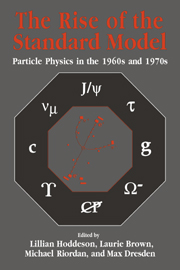Book contents
- Frontmatter
- Contents
- Contributors
- Editors' Acknowledgments
- Photographs of the Symposium
- Abbreviations and Acronyms
- Mathematical Notation
- Part One Introduction
- Part Two Quarks and Leptons
- Part Three Toward Gauge Theories
- Part Four Accelerators, Detectors, and Laboratories
- 15 The Rise of Colliding Beams
- 16 The CERN Intersecting Storage Rings: The Leap into the Hadron Collider Era
- 17 Development of Large Detectors for Colliding-Beam Experiments
- 18 Pure and Hybrid Detectors: Mark I and the Psi
- 19 Building Fermilab: A User's Paradise
- 20 Panel Session: Science Policy and the Social Structure of Big Laboratories
- 21 Some Sociological Consequences of High-Energy Physicists' Development of the Standard Model
- 22 Comments on Accelerators, Detectors, and Laboratories
- Part Five Electroweak Unification
- Part Six The Discovery of Quarks and Gluons
- Part Seven Personal Overviews
- Index
22 - Comments on Accelerators, Detectors, and Laboratories
Published online by Cambridge University Press: 03 February 2010
- Frontmatter
- Contents
- Contributors
- Editors' Acknowledgments
- Photographs of the Symposium
- Abbreviations and Acronyms
- Mathematical Notation
- Part One Introduction
- Part Two Quarks and Leptons
- Part Three Toward Gauge Theories
- Part Four Accelerators, Detectors, and Laboratories
- 15 The Rise of Colliding Beams
- 16 The CERN Intersecting Storage Rings: The Leap into the Hadron Collider Era
- 17 Development of Large Detectors for Colliding-Beam Experiments
- 18 Pure and Hybrid Detectors: Mark I and the Psi
- 19 Building Fermilab: A User's Paradise
- 20 Panel Session: Science Policy and the Social Structure of Big Laboratories
- 21 Some Sociological Consequences of High-Energy Physicists' Development of the Standard Model
- 22 Comments on Accelerators, Detectors, and Laboratories
- Part Five Electroweak Unification
- Part Six The Discovery of Quarks and Gluons
- Part Seven Personal Overviews
- Index
Summary
The most striking thing about the papers presented in this session is that, aside from Sharon Traweek, the speakers have tended to gloss over or to ignore completely the presence of controversy and conflict in the treatment of their topics.
Of course, it is always dangerous for an historian to draw attention to this dimension of the way scientists present the past. We lay ourselves open to two kinds of charges. First, that we are simply interested in muckraking, in giving physicists a bad press, in seeking to wash dirty linen in public so as to create a sensation and to boost our own visibility. Second, while physicists admit that they do sometimes disagree, they also insist that the community rapidly converges on a shared understanding of events. Historians who stress controversy are simply exaggerating, blowing up out of proportion what are simply normal, unimportant differences of opinion between rational human beings.
For my part let me say at once that yes, we do perhaps have a tendency to concentrate on controversy. Writing history would be pretty boring otherwise! On the other hand, this is done not to titillate, but with far more important aims in mind. Indeed it amounts to a very different way of dealing with the past than that conventionally favored by scientists themselves.
Put crudely, scientists reflecting on their own history tend to start from the present and to cast their eyes back over the past, identifying highlights and allocating credit.
- Type
- Chapter
- Information
- The Rise of the Standard ModelA History of Particle Physics from 1964 to 1979, pp. 394 - 400Publisher: Cambridge University PressPrint publication year: 1997



